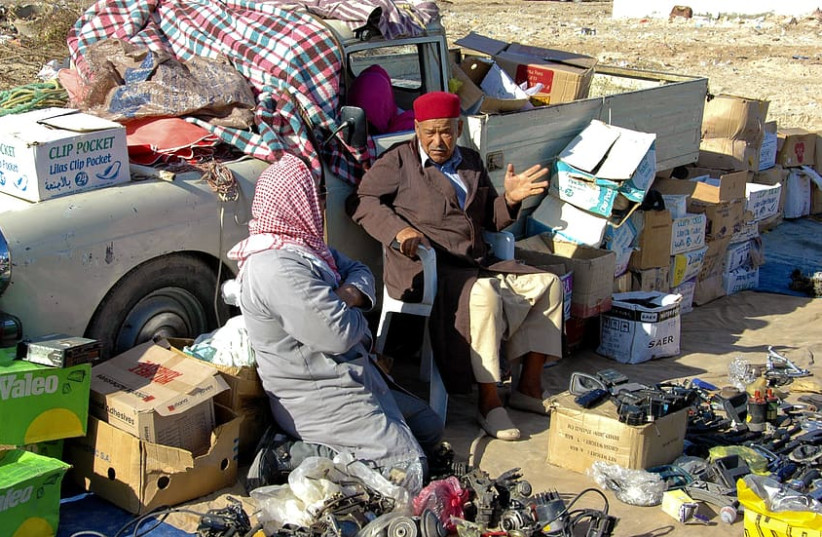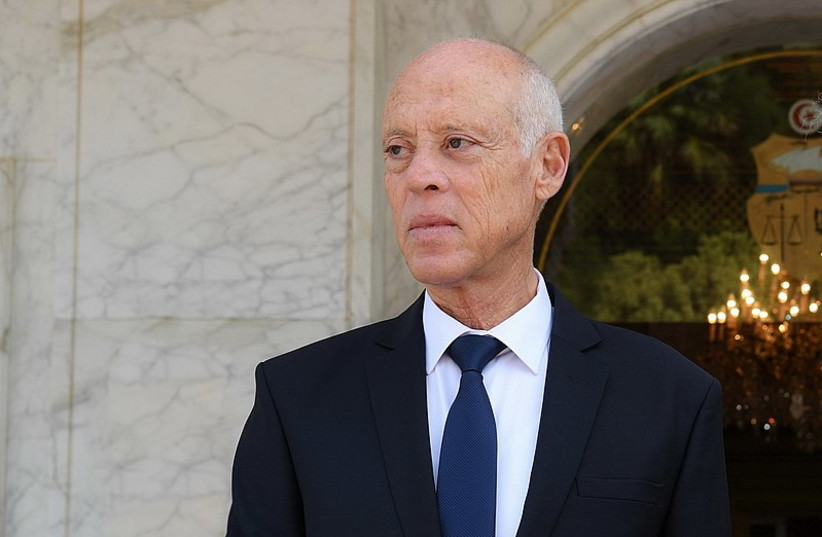The Tunisian government is in the process of creating a migration management cooperation plan with the European Union, despite the EU’s condemnations of Tunisian President Kais Saied’s authoritarian actions in the last two years.
For more stories from The Media Line go to themedialine.org
Earlier this month, a meeting was held in Tunis attended by European Commission President Ursula von der Leyen, Italian Premier Giorgia Meloni, Dutch Prime Minister Mark Rutte, and Tunisian President Kais Saied. Reportedly, the meeting concluded with an initial agreement on the management of migrants.
According to the UNHCR, over 75,000 African immigrants arrived on the European coasts via illegal routes in 2023. Italy, which has the largest concentration of arrivals, has taken in over 56,000 migrants, of which around 27,000 have arrived through Tunisia. This North African country serves as a launching point for both immigrants from Sub-Saharan Africa and lately Tunisians migrating themselves.
“The past couple of years have seen a sharp rise in arrivals of migrants from Tunisia, especially to Italy. Compared to previous years, Tunisians did not form a large demographic when it comes to migrants trying to flee to Europe, but since 2020, they increasingly figure in migrant demographics,” said Kelly Petillo, Middle East and North Africa program coordinator at the European Council on Foreign Relations.
She told The Media Line that the main motives pushing Tunisians to leave are related to the economic collapse that their country is witnessing.

“This worsened during the past ten years since the Arab Spring, and intensified even more since the pandemic,” Petillo added. “However, these are also driven by Saied’s rising authoritarianism which prevents any reforms required to lift the country from its economic woes.”
In July 2021, President Saied declared a state of emergency, dismissed the government, suspended parliament, and ruled by decree for about a year until a new constitution that concentrated power in the hands of the president was approved in July 2022. Since then, Saied has faced broad international and internal criticism claiming an authoritarian turn in the only country seen to successfully transition to democracy after the Arab Spring.
Even as Europe has been very vocal in condemning Saied’s actions, it also has a great interest in keeping Tunisia as an ally. In addition to the migrant issue, the Russo-Ukrainian war has created the need for Europe to look for different energy sources, as Russia was one of the main providers.
“Taken within the context of the COVID-19 pandemic and the war in Ukraine, European powers have chosen to focus on the aspects of Tunisia’s democratic backsliding which impact their own borders more directly, such as rising migration and ensuring alternative supplies of energy to reduce dependence on Russia,” said James Trigg, a senior analyst for the Middle East and North Africa region with Janes.
As for President Saied, this is a great opportunity to both gain international legitimacy and receive monetary aid despite condemnation.
Silvia Boltuc, managing director at SpecialEurasia, explains that this scenario of Europe aiding countries with questionable human rights issues and lower democracy standards to stop migration flow has precedent.
“This would not be the first time for Europe. See for example Azerbaijan and Turkey, two countries that raised human rights concerns, but which represent two of the major European partners,” she told The Media Line, adding that many African countries are far from European democratic standards.
“In general, when it comes to preventing large-scale migration, the EU has proven able to ignore concerns over democracy and human rights,” Petillo added, citing the border management cooperation with Egypt’s Sisi government.
“Independent human rights groups criticize [Sisi] for his undemocratic and abusive conduct but the EU and its member states do not hesitate to make deals [with him] to curb migration, more recently through €100 million in assistance granted by the EU to Egypt to prevent a wave of Sudanese refugees,” she said.
How is Saied likely to capitalize on the migrant situation?
“Saied is likely trying to join other regional leaders like Erdogan in terms of using Europe’s imperative around reducing migration to secure financial support and other guarantees,” Petillo said, adding that he will likely use this to unlock International Monetary Fund (IMF) aid and other economic support.
Tunisia is seeking a bailout loan from the IMF worth close to $2 billion. But to approve the loan, the IMF has set a series of conditions that Saied has called “foreign diktats,” which he is not willing to agree to. The talks are currently stalled.

But Italian Premier Giorgia Meloni, one of the European actors most interested in cooperating with Saied, “has already shown proneness to ask the IMF to relax certain requirements regarding reforms it asked Tunisia to perform in exchange for support if this can help contain migration from Tunisia,” noted Petillo.
Boltuc highlighted the recent shipwreck in Greece, which she says has shown the urgency of finding a compromise that lays the foundations for stabilizing these countries.
“These measures should be accompanied by policies for the economic and democratic development of these countries and clear monitoring mechanisms so that the blockade of migrants does not translate into a condition such as that which occurred in Libya,” Boltuc said.
But she continued that Saied’s intentions have raised concerns, referring to his accusation that Sub-Saharan migrants are causing violence and crime, provoking a wave of indignation. In a recent speech, he claimed that illegal immigration to Tunisia amounted to a criminal enterprise aimed at changing the demographic composition of Tunisia, to transform the country into an “African-only” one and erase its “Arab-Muslim.”
Boltuc believes that Saied’s rhetoric of hostility towards immigrants serves him two purposes. First, it could be a way for him to show his seriousness in combating this phenomenon in Europe. Second, it could help shift the local attention to external threats, which might create a distraction for the internal audience from the failed economy and domestic critical issues.
But Trigg believes that the second is more correct.
“It is more likely that Saied is seeking to maintain and bolster support amongst the nationalistic elements of his base with populist, anti-migrant rhetoric rather than seeking to weaponize migration flows or ingratiate himself with European leaders,” he said.
In any case, Boltuc explained that the migration management plan has two main pillars: to enhance collaboration with partner nations and to strengthen operational measures on search and rescue and return procedures, as well as smoother and faster voluntary solidarity.
“It will not only contrast migration by combatting the smuggling of migrants and trafficking of human beings and strengthening border management but there should also be an improved European coordinated activity,” she said.
But Armin Osmanovic, regional representative of North Africa at Rosa Luxemburg Stiftung based in Tunis, believes that the plan will not serve to stop migration.
“I think the plan will not change the overall picture. Migration routes will change, but we can’t stop people, we only contribute to more suffering somewhere else,” he said.
